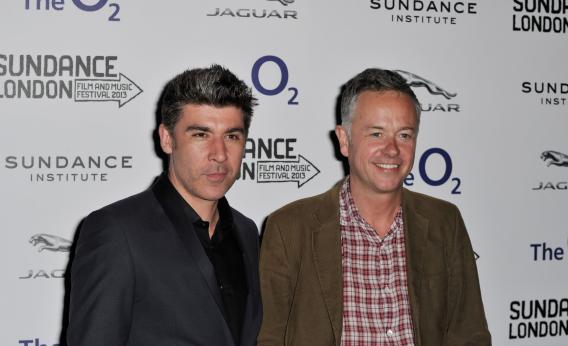British writer-director Michael Winterbottom’s The Look of Love is a puzzlingly misconceived biopic: a tasteful, subdued movie about a man who was as tasteless and unsubdued as they come. Winterbottom’s frequent muse, the comedian Steve Coogan, plays Paul Raymond, a nightclub owner and publisher of soft-core porn who was for a time the richest man in the U.K. Raymond’s reign as the king of nudie-show promoters and lad-mag peddlers lasted from the late ‘50s through the early ‘90s, when he became a recluse until his death in 2008. Winterbottom’s screenplay follows Raymond’s life from his early career in swinging Soho—cleverly presented in the style of a black-and-white period documentary—up through the personal tragedy that eventually caused him to withdraw from public life.
Raymond was a fascinating figure: a self-made tycoon with aspirations to upper-class respectability, an unapologetic publicity hound, and a serial womanizer. He could treat his wife Jean (here played by Anna Friel) with shocking callousness, but doted on their daughter Debbie (played as an adult by Imogen Poots), whom he tried unsuccessfully to launch as a (fully clothed) singer in one of his mildly naughty revues. Meanwhile, he essentially cut off both son with Jean and a second illegitimate one, who met his father only once during his life. What were his motivations for favoring his daughter so intensely? Why, after spending years launching his nightclub empire with the practical-minded Jean—who choreographed the nude dance numbers and allowed her husband all the chorus girls he wanted on the side—did Paul abruptly leave her for the nude model Fiona Richmond (Tamsin Egerton)?
Winterbottom’s choice to cram three decades’ worth of events into a slim 97 minutes (in an inert frame story, we see Raymond as an old man watching video-cassette chronicles of his younger days) prevents the filmmakerfrom exploring the very questions that could give this seriocomic movie some dramatic heft. Many scenes feel choppy and overly short, as if they were missing a dialogue beat or two. Coogan can be a hilarious improviser—a gift on full display in Winterbottom’s 2011 comedy The Trip—but sometimes his director seems to have gone with the firstsemi-amusing take, rather than using improv as a base to develop a comic idea. Coogan’s Raymond has a habit of quoting the epigrams of Oscar Wilde, with whose amoral sophistication he evidently identifies. But it’s not clear whether either actor or director are aware that their protagonist’s own mots are not all that bons.
As played by an actor with Coogan’s comic and dramatic chops, Raymond should have made for prime biopic material. But The Look of Love seems unsure where to focus its gaze. The first half or so concentrates on the protagonist’s rise to tabloid infamy and his relationship with his wife, magnificently played by Friel (why don’t we get more Anna Friel on the big screen these days? I’ve been a fan since 2001’s Me Without You.) Then, after their divorce (for which Jean received a then-record settlementof 250,000 pounds), Friel’s character—and the movie’s best performance–all but disappears as Winterbottom concentrates first on Paul’s affair with Fiona, then on his unhealthy attachment to his spoiled, drug-addicted daughter.
The milieu in which The Look of Love unfolds is deeply misogynistic—there are Mad Men-esque glimpses of the mid-20th-century patriarchy at its unacknowledged, soul-killing worst. But the director himself seems deeply enamored, and respectful, of his female characters. Even Egerton’s Fiona, an ambitious starlet with a gift for dirty talk, doesn’t come off as a dumb-slut stereotype but as a bold, confident young woman testing (and finding) the limits of her power. Imogen Poots is also excellent as the semi-talented daddy’s girl spiraling down the hole of addiction, a role that could easily have been played for its most maudlin notes. But each of the three complex, mistreated women in Raymond’s life gets only one-third of a movie in which to tell her story—while Raymond himself, though constantly on-screen, remains frustratingly two-dimensional and opaque. Winterbottom has done television before (The Trip in its original form was a BBC series)—maybe this project should have been conceived as a multipart series as well.
That’s not to say there’s no reason to see The Look of Love.The movie looks smashing, with witty production design by Jacqueline Abrahams (showing young ladies around his ultra-mod ‘70s bachelor penthouse, Paul notes proudly that“it was designed by Ringo Starr”) and splashy costumes by Stephanie Collie. There are beautiful nude women posing in lion cages and diving into onstage aquariums, always a plus for any movie. And the period music is not only intrinsically delightful, but well integrated into the story—Donovan’s sickly-sweet, irresistibly catchy “MellowYellow” serves as the perfect soundtrack to Paul and Fiona’s falling-in-love montage, while the title song by Burt Bacharach appears in a heartbreakingly almost-beautiful performance by the sort-of-talented Debbie. It’s hard to understand why a movie with Bacharach ballads, Steve Coogan and naked ladies isn’t more fun than The Look of Love turns out to be.
